小学英语语法专项练习 -现在完成时4
小学英语语法专题训练:一般现在时(含答案)
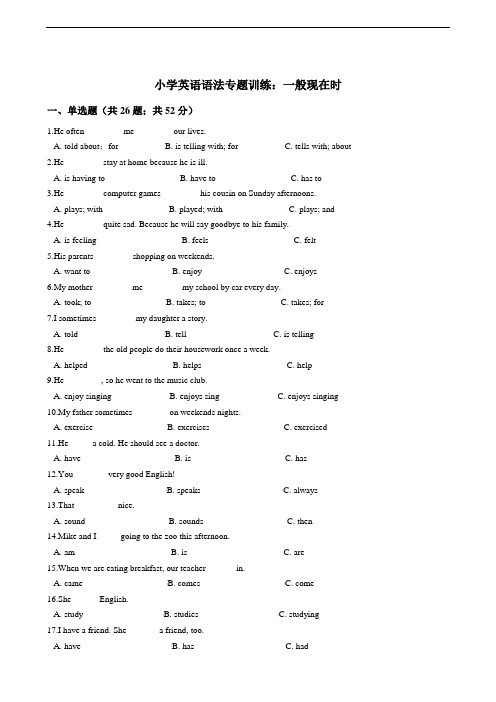
小学英语语法专题训练:一般现在时一、单选题(共26题;共52分)1.He often ________ me ________ our lives.A. told about;forB. is telling with; forC. tells with; about2.He ________ stay at home because he is ill.A. is having toB. have toC. has to3.He ________ computer games ________ his cousin on Sunday afternoons.A. plays; withB. played; withC. plays; and4.He ________ quite sad. Because he will say goodbye to his family.A. is feelingB. feelsC. felt5.His parents ________ shopping on weekends.A. want toB. enjoyC. enjoys6.My mother ________ me ________ my school by car every day.A. took; toB. takes; toC. takes; for7.I sometimes ________ my daughter a story.A. toldB. tellC. is telling8.He ________ the old people do their housework once a week.A. helpedB. helpsC. help9.He ________, so he went to the music club.A. enjoy singingB. enjoys singC. enjoys singing10.My father sometimes________ on weekends nights.A. exerciseB. exercisesC. exercised11.He _____a cold. He should see a doctor.A. haveB. isC. has12.You _______ very good English!A. speakB. speaksC. always13.That _________ nice.A. soundB. soundsC. then14.Mike and I_____ going to the zoo this afternoon.A. amB. isC. are15.When we are eating breakfast, our teacher ______ in.A. cameB. comesC. come16.She ______English.A. studyB. studiesC. studying17.I have a friend. She_______ a friend, too.A. haveB. hasC. had18.That nice.A. soundB. soundingC. sounds19.She always _____________ cakes at the weekend.A. makeB. makes20.Mary a very bad cold, so she has to see a doctor.A. makeB. haveC. has21.What ________ Darning ________ at Christmas?A. does; doesB. do; doC. does; do22.He sometimes ______ with his friends.A. playing footballB. play footballC. plays footballD. played football23.I often ________ stories to my little sister.A. readB. readsC. reading24.The earth __________ around the sun.A. goB. goesC. going25.He often ___________ to school by bus.A. goesB. goC. went26.The earth ___________ around the sun.A. goB. goesC. went二、选词填空(词汇运用)(共10题;共14分)27.My mother often ________ (go/goes) to bed at 9:30 pm.28.I usually ________ to school. (walk, walked)29.She often ________(does/did) her homework in the evening.30.Lingling ________ (has/ have) got a new computer.31.The birds ________ (live / lives) in the tree.32.It ________ (say/ says) snakes can't hear.33.My uncle often ________ (go/goes) to work by bus.34.Everyone ________ (need/needs) water.35.The little cat ________ (like/likes) eating fish.36.看图选词并用其适当形式填空。
小学英语语法专题训练:现在进行时(含答案)
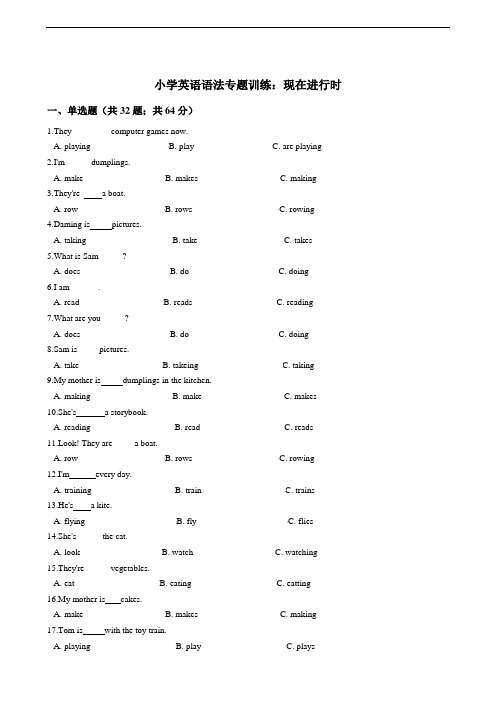
小学英语语法专题训练:现在进行时一、单选题(共32题;共64分)1.They ________ computer games now.A. playingB. playC. are playing2.I'm _____ dumplings.A. makeB. makesC. making3.They're a boat.A. rowB. rowsC. rowing4.Daming is pictures.A. takingB. takeC. takes5.What is Sam _____?A. doesB. doC. doing6.I am ______.A. readB. readsC. reading7.What are you _____?A. doesB. doC. doing8.Sam is ____ pictures.A. takeB. takeingC. taking9.My mother is dumplings in the kitchen.A. makingB. makeC. makes10.She's a storybook.A. readingB. readC. reads11.Look! They are ____ a boat.A. rowB. rowsC. rowing12.I'm every day.A. trainingB. trainC. trains13.He's a kite.A. flyingB. flyC. flies14.She's _____ the cat.A. lookB. watchC. watching15.They're _____ vegetables.A. eatB. eatingC. eatting16.My mother is cakes.A. makeB. makesC. making17.Tom is with the toy train.18.Is Kitty ________with her toys?A. playB. playsC. playing19.Listen! The wind ________ strongly. Don't go outside!A. blowsB. blowC. is blowing20.Sam always _______ basketball after school. But now he _______ football.A. play; is playingB. plays; is playingC. plays; playing21.—________ you listening to music in your room?— No. I'm ________TV.A. Do; watchingB. Are; watchingC. Can; watch22.Is she ________ water in the kitchen?A. drinkingB. drinkC. drinks23.The children ________ a good time at the party now.A. haveB. havingC. are having24.The white rabbit is ________a coat.A. wearingB. wearC. wears25.Look, the girl is the clothes.A. washB. washingC. washes26.The wind ____________.A. is blowB. is blowingC. blow27._______________ this photo, the sun is _______________.A. On; shiningB. On; shineC. In; shiningD. In; shine28.The birds are ____________________ in the trees.A. singB. singsC. sangD. singing29.Why are you _______________?A. laughB. laughsC. laughedD. laughing30.I'm __________________ my homework.A. didB. doingC. doesD. do31.I am ______________ an ice cream.A. hadB. hasC. havingD. have32.The birds are _______________ in the trees.A. singsB. sangC. singingD. sing二、语法填空(共18题;共19分)33.—Where is Mum?—She________ (wash) her hair in the bathroom.34.—Look! What's the man doing?—Oh, he ________ (smoke).35.The car is ________ (go) fast.36.They ________ (look) at the blackboard now.37.—What is the boy doing?—He ________ (skate) there.38.My sister is ________ (wear) a red dress.39.It's three in the afternoon. Jill ________ (paint) in the park.40.Look! What's he ________ (do) in the classroom?41.The wind is ________ (blow).42.The windmill is ________ (move) slowly.43.You are both ________ (have) a good time.44.I'm ________ (enjoy) the sunshine.45.Sam usually________ (play) basketball after school. But now he________ (paint) a picture.46.—Where is your brother—He________ (sit) under the tree.47.The horses are ________ (run).48.he________(learn) English now!49.They are ________ (cook) breakfast in the kitchen now.50.Look! The girls ________ (dance) in the classroom.答案解析部分一、单选题1.【答案】C【考点】现在进行时【解析】【分析】句意:他们……电脑游戏。
(完整版)小学英语语法练习全练习答案

一、写出下列动词的过去式1. Is-was2. Are-were3. Have-had4. Go-went5. Do-did6. stop –stopped7. See-saw8. Sit-sat9. stay-stayed10. Eat-ate11. Thank-thanked 12. Decide-decided 13. feel-felt14. Make-made15. Cry-cried16.know-knew17.catch-caught18.draw-drew 19.study-studied20.stay-stayed二、单项选择:从下列各题后所给的四个选项中选择最佳答案填空。
(10)( )1. My father ________ ill yesterday.A. isn't Baren't C. wasn't D. weren't( )2. ________ your parents at home last week﹖A.IsB.WasC. AreD.Were( )3. The twins ________ in Dalian last yearThey ________ here now.A.are; wereB. were; areC. was; areD. were; was ( )4.________ your father at work the day ________ yesterday?A. Was; beforeB.Is; beforeC.Was; afterD.Is; after ( )5—Who was on duty last Friday﹖— ________.A. I amB. I wasC. Yes, I wasD. No, I wasn't ( )6. I cleaned my classroom ___________.A. with three hoursB. three hours agoC. in three hoursD. three hours before( ) 7. I came _______ my house two days ago.A. back onB. back toC. to backD. back( ) 8. —___________? —He did some reading at home.A What does your father do yesterday eveningB. What does your brother do in the schoolC. What did your brother do over the weekendD. Where did your brother go last Sunday( ) 9. —What did you do ________ ? —I went to the movies.A. next morningB. over the weekendC. in the weekendD. next Monday ( ) 10. The koala sleeps _______, but gets up _________.A. during the day; at the eveningB. at day ;during nightC. in the day; during the eveningD. during the day ; at night三、用括号中所给词的过去式填空。
小学英语语法专题训练:动词(含答案)
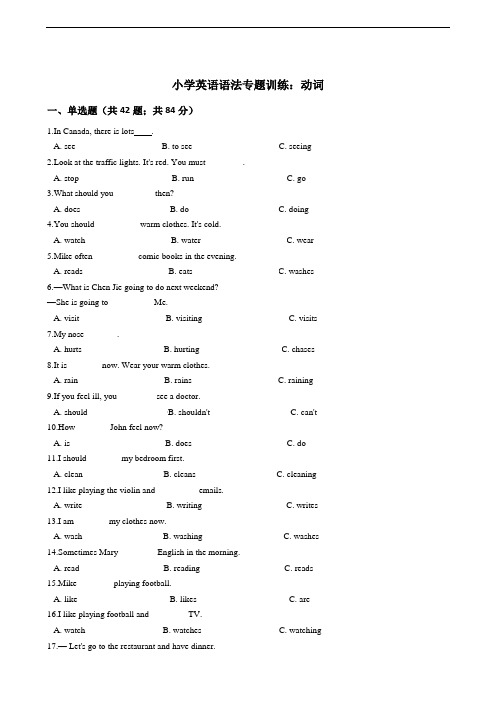
小学英语语法专题训练:动词一、单选题(共42题;共84分)1.In Canada, there is lots .A. seeB. to seeC. seeing2.Look at the traffic lights. It's red. You must ________.A. stopB. runC. go3.What should you _________then?A. doesB. doC. doing4.You should __________warm clothes. It's cold.A. watchB. waterC. wear5.Mike often __________comic books in the evening.A. readsB. eatsC. washes6.—What is Chen Jie going to do next weekend?—She is going to __________Me.A. visitB. visitingC. visits7.My nose _______.A. hurtsB. hurtingC. chases8.It is _______ now. Wear your warm clothes.A. rainB. rainsC. raining9.If you feel ill, you ________ see a doctor.A. shouldB. shouldn'tC. can't10.How _______ John feel now?A. isB. doesC. do11.I should _______ my bedroom first.A. cleanB. cleansC. cleaning12.I like playing the violin and _________ emails.A. writeB. writingC. writes13.I am _______ my clothes now.A. washB. washingC. washes14.Sometimes Mary ________ English in the morning.A. readB. readingC. reads15.Mike________ playing football.A. likeB. likesC. are16.I like playing football and ________ TV.A. watchB. watchesC. watching17.— Let's go to the restaurant and have dinner.— That _______interesting.A. soundsB. cleansC. shows18.— I have got a new book and a stamp about China. What about you? — I have got a new book about China, too. But I_______got a stamp.A. haveB. don't haveC. haven't19.Lin Tao can __________.A. drawB. drawsC. drawing20.—______you got a new stamp?— Yes, I have.A. HaveB. DoC. Are21._______ is her hobby.A. RunningB. RunsC. Runing22.Let's________to Chinatown now.A. to goB. goC. going23.Let's ______ to the park tomorrow.A. goingB. to goC. go24.I _______you can pass the exam. Because you work very hard.A. believeB. eatC. say25.—_______you got a hobby?— Yes, I have.A. DoB. AreC. Have26.—Can you speak English?—Yes, I _______.A. doB. haveC. can27.________table tennis is my hobby.A. PlayB. PlayingC. Plays28.Can you ________ my pen friend?A. areB. amC. be29.Look at the library_______. It says, "Don't talk in the room."A. ruleB. roomC. sound30.—I don't know what to do. Can you help me?—You _______think it hard by yourself.A. doB. shouldC. will31.— Do you understand me?— Yes, because I can_____a little English.A. speakB. tellC. say32.My sister can _______ pictures.A. drawB. drawsC. drawing33.Look! The girl is ________ a football game.A. lookingB. seeingC. watching34.—______you______cars?—Yes, I do.A. Have; gotB. Do; collectC. Are; having35._______ is my hobby.A. Collecting stampsB. Collecting stampC. Collect stamps36.My father likes at the weekends.A. going to fishB. go fishingC. going fishD. going fishing37.Did Nancy after school?A. walk homeB. walk to homeC. walked to homeD. walk to the home38.My father often __________stories to us in the evening.A. tellsB. talkC. saysD. speaks39._______ your mother see a film yesterday evening?A. AreB. DidC. WasD. Is40.He could not _________ his book.A. findB. look afterC. foundD. looked41.My mother likes __________new clothes and she can_________ nice clothes.A. make; makeB. making; makesC. making; makeD. making; making42.I'm going to ___________ him English.A. teachsB. teachesC. teach二、填空题(共1题;共1分)43.—What's your hobby?—________(collect stamps) is my hobby. It's my stamp album (册子).三、选词填空(词汇运用)(共5题;共5分)44.He works very hard and ________ (stay/stays) healthy.45.—How ________ (do/does) he go to work?—By car.46.—What does Linda ________ (look like/like)?—She is thin and short.47.I think we should ________ (goes/go) to Shanghai first.48.She________ (can't/can) walk, she is too young.四、语法填空(共1题;共1分)49.Lets________ (play) basketball this weekend.五、单词拼写(词汇运用)(共1题;共6分)50.写出下列动词的第三人称单数形式。
小学英语语法专项练习题

小学英语语法专项练习题一、名词专项练习1. 将下列名词变成复数形式:a. catb. bookc. childd. boxe. mouse2. 选择正确的名词填空:a. I have two _______ (brother/brothers).b. The _______ (tooth/teeth) are shiny.c. There are many _______ (sheep/sheeps) in the field.二、冠词专项练习1. 在下列句子中填入适当的冠词(a/an/the):a. I saw _______ elephant in the zoo.b. She is _______ teacher.c. Can you pass me _______ pen, please?2. 判断下列句子是否正确,错误的请改正:a. I like to eat apple.b. He is doctor.c. She has a cat.三、代词专项练习1. 将下列句子中的名词替换为相应的代词:a. Lucy gave a book to Lily.b. The children played with the toys.c. We saw the dog and the cat.2. 选择合适的代词填空:a. _______ (He/She) is my best friend.b. _______ (I/You) am going to the park.c. _______ (They/We) are happy.四、动词专项练习1. 将下列动词变成过去式:a. gob. eatc. dod. playe. read2. 选择正确的动词填空:a. She _______ (likes/like) playing the piano.b. They _______ (go/went) to the cinema last night.c. I _______ (am/is) hungry.五、形容词和副词专项练习1. 将下列名词变成形容词:a. happyb. bigc. sadd. talle. sunny2. 选择合适的形容词或副词填空:a. She is a _______ (good/well) singer.b. He runs _______ (fast/fastly).c. The weather is _______ (nice/nicely).六、介词专项练习1. 在下列句子中填入适当的介词:a. She goes to school _______ foot.b. The cat is _______ the table.c. I was born _______ May 5th.2. 选择正确的介词填空:a. He lives _______ (in/on) New York.b. She is sitting _______ (at/) the window.c. They are going to the park _______ (at/in) the afternoon.七、连词专项练习1. 用适当的连词完成句子:a. She is tired, _______ she keeps working.b. You can go out _______ you finish your homework.c. I like tea, _______ I prefer coffee.2. 选择正确的连词填空:a. _______ (and/or) I will go to the library.b. _______ (but/and) he didn't want to.c. _______ (because/so) it was raining, we stayed at home.八、数词专项练习1. 将下列基数词变成序数词:a. fourb. ninec. twelved. twentye. hundred2. 选择正确的数词填空:a. She is _______ (second/seconds) in her class.b. The meeting starts at _______ (eight/eighth)o'clock.c. I live on the _______ (ten/teenth) floor.九、句型转换专项练习1. 将下列句子变成一般疑问句:a. She likes apples.b. He is reading a book.c. They will go to the party.2. 将下列句子变成否定句:a. I can swim.b. You are late.c. We have finished our homework.十、时态专项练习1. 将下列句子变成过去进行时:a. She sings in the choir.b. He is reading a newspaper.c. They are playing football.2. 将下列句子变成将来时:a. I go to school every day.b. You are watching TV.c. He does his homework every evening.十一、被动语态专项练习1. 将下列句子变成被动语态:a. She cleans the room every day.b. They will repair the car.c. He is writing a letter.2. 选择正确的被动语态句子:a. The book _______ (is read/reads) many students.b. The cake _______ (is baked/bakes) the chef.c. The experiment _______ (is conducted/conducts) in the lab.答案一、名词专项练习1. a. cats b. books c. children d.boxes e. mice2. a. brothers b. teeth c. sheep二、冠词专项练习1. a. an b. a c. a2. a. I like to eat an apple. b. He is adoctor. c. Correct三、代词专项练习1. a. Lucy gave it to her. b. They played with them. c. We saw it and it.2. a. She b. I c. They四、动词专项练习1. a. went b. ate c. did d. played e. read2. a. likes b. went c. am五、形容词和副词专项练习1. a. happy b. big c. sad d. tall e. sunny2. a. good b. fast c. nice六、介词专项练习1. a. on b. on c. on2. a. in b. c. in七、连词专项练习1. a. but b. after c. although2. a. and b. but c. because八、数词专项练习1. a. fourth b. ninth c. twelfth d. twentieth e. hundredth2. a. second b. eighth c. tenth九、句型转换专项练习1. a. Does she like apples? b. Is he reading abook? c. Will they go to the party?2. a. I cannot swim. b. You are not late. c. We have not finished our homework.十、时态专项练习1. a. She was singing in the choir. b. He was readinga newspaper. c. They were playing football.2. a. I will go to school every day. b. You will be watching TV. c. He will do his homework every evening.十一、被动语态专项练习1. a. The room is cleaned her every day. b. The car will be repaired them. c. A letter is being written him.2. a. is read b. is baked c. is conducted。
小学英语语法及其各时态专项练习题
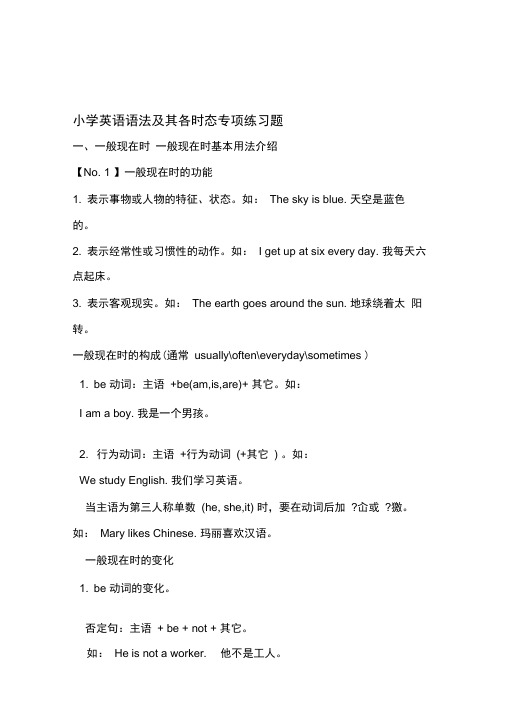
小学英语语法及其各时态专项练习题一、一般现在时一般现在时基本用法介绍【No. 1 】一般现在时的功能1. 表示事物或人物的特征、状态。
如:The sky is blue. 天空是蓝色的。
2. 表示经常性或习惯性的动作。
如:I get up at six every day. 我每天六点起床。
3. 表示客观现实。
如:The earth goes around the sun. 地球绕着太阳转。
一般现在时的构成(通常usually\often\everyday\sometimes )1. be 动词:主语+be(am,is,are)+ 其它。
如:I am a boy. 我是一个男孩。
2. 行为动词:主语+行为动词(+其它) 。
如:We study English. 我们学习英语。
当主语为第三人称单数(he, she,it) 时,要在动词后加?屳或?獥。
如:Mary likes Chinese. 玛丽喜欢汉语。
一般现在时的变化1. be 动词的变化。
否定句:主语+ be + not + 其它。
如:He is not a worker. 他不是工人。
一般疑问句:Be +主语+其它。
如:-Are you a student?-Yes. I am. / No, I'm not.特殊疑问句:疑问词+一般疑问句。
如:Where is my bike?2. 行为动词的变化。
否定句:主语+ don't( doesn't ) + 动词原形(+其它) 。
如:I don't like bread.当主语为第三人称单数时,要用doesn't 构成否定句。
如:He doesn't often play.一般疑问句:Do( Does ) + 主语+动词原形+其它。
如:- Do you often play football?- Yes, I do. / No, I don't.当主语为第三人称单数时,要用does 构成一般疑问句。
小学英语语法时态练习(含答案)
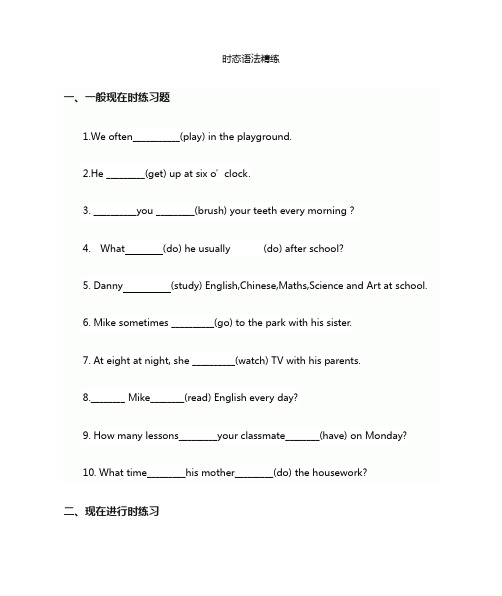
时态语法精练一、一般现在时练习题1.We often___________(play) in the playground.2.He _________(get) up at six o’clock.3. __________you _________(brush) your teeth every morning?4. What (do) he usually (do) after school?5. Danny (study) English,Chinese,Maths,Science and Art at school.6. Mike sometimes __________(go) to the park with his sister.7. At eight at night, she __________(watch) TV with his parents.8.________ Mike________(read) English every day?9. How many lessons_________your classmate________(have) on Monday?10. What time_________his mother_________(do) the housework?二、现在进行时练习1、I _______________________( look for) a shirt, I’m looking for a tie.2、They ______________________( plant) flowers in the yard now.3、Miss Baker _________________( drink) milk in the cafeteria now.4、What are you _________(do) now? I ___________(eat) bread.5、It’s nine o’clock. My father_______________(work) in the office.6、Look, the boy____________(put) the rubbish into the bin.7、__________he__________(clean) the classroom? No, he isn’t. He____________(play).8、Where is Mike? He___________(run) on the grass.9Listen,who____________(sing) in the music room? Oh, Mary_____________(sing) there.10、Who_______(sing)a song? ----Li Ying is.三、一般将来时练习( ) 1. There __________ a meeting tomorrow afternoon.A. will be going toB. will going to beC. is going to beD. will go to be( ) 2. Charlie ________ here next month.A. isn’t workingB. doesn’t workingC. isn’t going to workingD. won’t work( ) 3. He ________ very busy this week, he ________ free next week.A. will be; isB. is; isC. will be; will beD. is; will be( ) 4. There ________ a dolphin show in the zoo tomorrow evening.A. wasB. is going to haveC. will haveD. is going to be( ) 5. –________ you ________ free tomorrow?– No. I ________ free the day after tomorrow.A. Are; going to; willB. Are; going to be; willC. Are; going to; will beD. Are; going to be; will be ( ) 6. Mother ________ me a nice present on my next birthday.A. will givesB. will giveC. givesD. give( ) 7. – Shall I buy a cup of tea for you?–________. (不,不要。
小学英语语法动词时态练习题
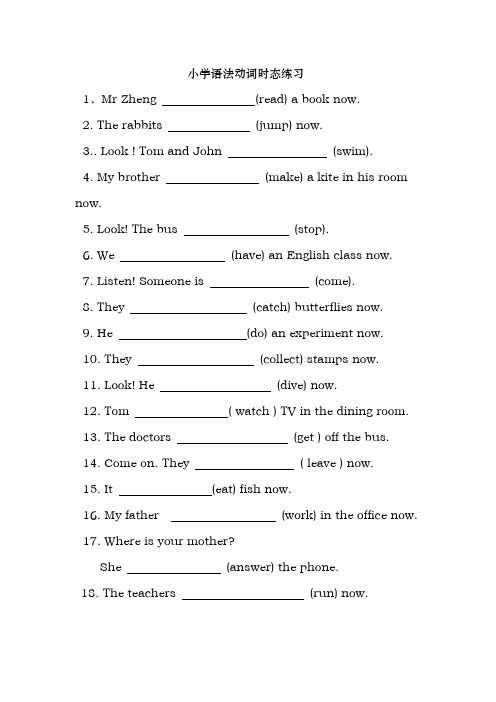
小学语法动词时态练习1.Mr Zheng (read) a book now.2. The rabbits (jump) now.3.. Look ! Tom and John (swim).4. My brother (make) a kite in his room now.5. Look! The bus (stop).6. We (have) an English class now.7. Listen! Someone is (come).8. They (catch) butterflies now.9. He (do) an experiment now.10. They (collect) stamps now.11. Look! He (dive) now.12. Tom ( watch ) TV in the dining room.13. The doctors (get ) off the bus.14. Come on. They ( leave ) now.15. It (eat) fish now.16. My father (work) in the office now.17. Where is your mother?She (answer) the phone.18. The teachers (run) now.一、用be动词的适当形式填空1. I _______ at school just now.2. He ________ at the camp last week.3. We ________ students two years ago.4. They ________ on the farm a moment ago.5. Yang Ling ________ eleven years old last year.6. There ________ an apple on the plate yesterday.7. There ________ some milk in the fridge on Sunday.8. The mobile phone _____ on the sofa yesterday evening.一、用be动词的适当形式填空1. I ______ an English teacher now.2. She _______ happy yesterday.3.They _______ glad to see each other last month.4. Helen and Nancy ________ good friends.5. The little dog _____ two years old this year.6. Look, there ________ lots of grapes here.7.There ________ a sign on the chair on Monday..8. Today _____ the second of June. Yesterday ______ the first of June. It _____ Children’s Day. All the students ______ very excited.一、用行为动词的适当形式填空1. He _________ (live) in Wuxi two years ago.2. The cat ________ (eat) a bird last night.3. We _______ (have) a party last Halloween.4. Nancy ________ (pick) up oranges on the farm last week.5. I ________ (make) a model ship with Mike yesterday.6. They ________ (play) chess in the classroom last PE lesson.7. My mother _______ (cook) a nice food last Spring Festival.8. The girls ________ (sing) and _______ (dance) at the party.一、用be动词的适当形式填空1. I ______ (watch) a cartoon on Saturday.2. Her father _______ (read) a newspaper last night.3. We _________ to zoo yesterday, we _____ to the park. (go)4. ______ you _______ (visit) your relatives last Spring Festival?5. ______ he _______ (fly) a kite on Sunday? Yes, he ______.6. Gao Shan _______ (pull) up carrots last National Day holiday.7. I ________ (sweep) the floor yesterday, but my mother______.8. What ______ she _______ (find) in the garden last morning? She __________ (find) a beautiful butterfly.填空。
小学英语语法专项练习题含答案
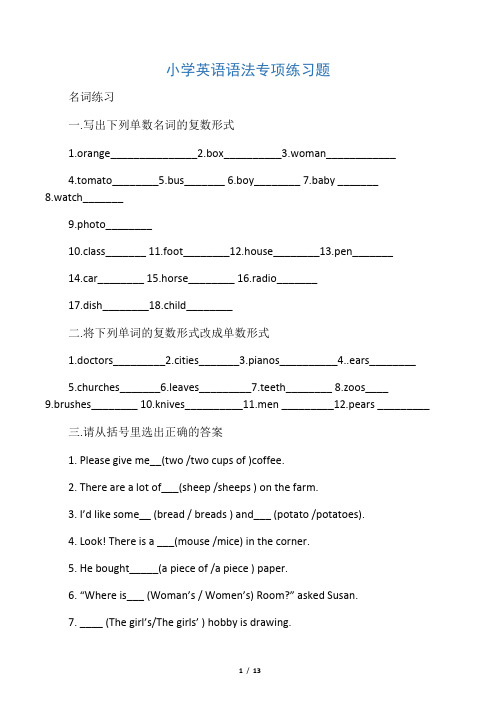
小学英语语法专项练习题名词练习一.写出下列单数名词的复数形式1.orange_______________2.box__________3.woman____________4.tomato________5.bus_______6.boy________7.baby _______8.watch_______9.photo________10.class_______ 11.foot________12.house________13.pen_______14.car________ 15.horse________ 16.radio_______17.dish________18.child________二.将下列单词的复数形式改成单数形式1.doctors_________2.cities_______3.pianos__________4..ears________5.churches_______6.leaves_________7.teeth________8.zoos____9.brushes________ 10.knives__________11.men _________12.pears _________三.请从括号里选出正确的答案1. Please give me__(two /two cups of )coffee.2. There are a lot of___(sheep /sheeps ) on the farm.3. I’d like some__ (bread / breads ) and___ (potato /potatoes).4. Look! There is a ___(mouse /mice) in the corner.5. He bought_____(a piece of /a piece ) paper.6. “Where is___ (Woman’s / Women’s) Room?” asked Susan.7. ____ (The girl’s/The girls’ ) hobby is drawing.8. Aunt Lucy sent_____ (a child’s /a children’s ) book to me.冠词练习一.在空格内填上a或an1._____ear2.______actor3._____hen4.______toy5.____university6.______ elephant7.______hat8.______umbrella9.______rabbit10.______idea 11.______hour 12_______ honest boy 13.______interestingbook 14.______easy question 15.______orange dress16_______X-ray machine 17______ice cream二.选择填空1.Mom tells her little daughter _____ old story every night. A. a B./ C. an D. the2. ______computer on the table is Susan’s.A. AB. AnC. TheD. /3.There is ______ map of the world on ______wall. ______map is mine.A. a, a, AB. a, the, TheC. the, the, TheD. the, the, A5. ______Spring comes after______winter.A. /, /B.The, /C.The, theD.A, the6.I bought ______shoes yesterday. ______ shoes are very beautiful. A.a, The B.a pair of, The C. the, The D. a pair, The pair 7.He was ______soldier in the Second World War.A. aB. anC. theD. /8.She can play______ and ______.A. the tennis, the guitarB. tennis, guitarC. the tennis, guitarD. tennis, the guitar9.I can see______moon and ______clouds in the sky. A. the, a B. a, aC. the, / D. the, the11. ______Tian’anmen Square is in__Beijing. A. /, / B. A, / C. The,/ D. /, the212.—Can you tell me ______nearest bookshop?—Go straight and turn right at_______third crossing, and you will see it. A. the, a B. the, the C. a, the D. the, /三根据中文,写出下列固定搭配的英文。
小学英语语法专项练习题含答案-(1)

小学英语语法专项练习题含答案-(1)1.Please give me two cups of coffee.2.There are a lot of sheep on the farm.3.I’d XXX.A。
/。
theB。
The。
aC。
/。
aD。
The。
the1.XXX an old story every night.2.The computer on the table is Susan's.3.There is a map of the world on the wall。
The map is XXX.5.Spring comes after winter.4.Look。
There is a mouse in the corner.5.XXX.6."Where is the Women's Room?" asked Susan.7.XXX drawing.8.Aunt Lucy sent a children's book to me.一.在空格内填上a或an1.an2.an3.a4.a5.a6.an7.a8.an9.a 10.an 11.an 12.an 13.an 14.an 15.an 16.an 17.an二.选择填空1.A2.The3.There is a map of the world on the wall。
The map is XXX.5.The Spring comes after winter.1.Play the lin2.XXX3.Take a look4.In the morning5.By the way6.On the left7.Have XXX8.Play chess9.At home10.At XXX1.Play the linIf you want to learn to play the lin。
the first thing you need to do is find a good teacher。
小学英语四大时态专项语法练习题(附答案)

四大时态专项练习一般现在时练习题一、写出下列动词的第三人称单数形式。
eat read dotake wash watchhave carry studyf ly catch gohave cook looksing teach likeget come play二、用单词的正确形式填空:1.Mike ___________ (do) his homework every day.2.There ____________ (be) some water in the glass.3.We like ____________ (play) basketball after class.4.I like singing. I often ____________ (listen) to the music in the evening.5.My grandma ___________ (watch) TV every day.三、选择最佳的答案:1. ____Alice often play the piano? No, she _____.A. Do; doB. Does; doesC. Does; doesn't2. ___ your penfriend __ in Beijing?A. Do; liveB. Do; livesC. Does; live3. Tom and Mike __ very excited, they will take a trip.A. isB. areC. am4. I like ________ very much. What about you?A. danceB. dancedC. dancing5. I can’t find my pen. Let me __.A. go and ask herB. go and ask hersC. go and ask she6. Ff is a good student. She ____maths.A. does good atB. well do itC. is good at7. The kite ____ a bird.A. look likeB. is lookingC. looks like8. Bill and I ___ good friends.A. isB. areC. am9. Sandy often ___ his homework on Sundays .A. doB. doesC. did10. What do you usually do on the weekend? I __________.A. went swimmingB. go swimmingC. visited grandparents11. What do you usually do on your holiday?A. saw elephantsB. sing and danceC.took picture12. I ____ a student. I go to school ____bus every day.A. is; byB. am; onC. am; by13. I ____ a brother. She ____ a sister.A. have; hasB. has; hasC. have; have14. You ____ a student. He ____ a teacher.A. is; isB. are; isC. are; are15. He always _____ football games.A. watchesB. watchC. doesn't16. My best friend _____ shells.A. collectsB. collectC. often17. She doesn’t _____ listening to the music.A. oftenB. likeC. likes18. My mother and I ___ always watch romantic films.A. doesn’tB. don’tC. do19. ---When _____ he get home on Friday?----He gets home at four on Friday.A. doB. doesC. did答案一、eats reads doestakes washes watcheshas carries studiesflies catches goeshas cooks lookssings teaches likesgets comes plays二、 1. does 2. is 3. playing 4.listen 5. Watches三、1-5 C C B C A 6-10 C C B B B 11-15 B C A B A16-19 A B B B现在进行时练习题一、写出下列单词的现在分词:do play dance sitmake swim jump cookclean watch come readeat write sing gorun fly catch help二、用单词的适当形式填空:1. look! Chen and Mike are ___________(sing)now.2. The small bear is ________ (climb) the tree.3. Mike is ________ (draw) picture.4. She is ________ (do) the dishes.5. My brother is ________ (make) kites.6. My father is ________ (read) a newspaper in living room.7. Ted is __________(answer) the phone.8. My uncle is ________ (drive) a car.9. The students are ________(listen) to their teacher carefully.10. Chen is _________(wash) clothes.三、选择正确答案1. Every one ____ to their teacher in the classroom.A. are listeningB. is listeningC. listen2. They are singing and ___ together at the party now.A. danceB. dancedC. dancing3. Listen! The birds ____.A. is singingB. are singC. are singing4. Look! The kite ___ in the sky. A. fly B. flies C. is flying5. They ____ riding a forse. A. is B. are C. am6. Kate ____ playing chess. A. am B. is C. are7. Are you washing clothes?A. Yes, you areB. Yes, I amC. No, I am8. Is he ____ TV?Yes, he is. A. watch B. watching C. not9. ____ they taking pictures.? Yes, they are.A. AmB. BeC. Are10. It’s 10 o’clock. Ben _____ TV in the bedroom.A. watchB. is watchingC. watches四、根据中文填空。
(完整版)小学英语语法专项练习题

小学英语语法练习题名词练习2.写出以下单数名词的复数形式2.将以下单词的复数形式改成单数形式11.men _________12.pears _________3.请从括号里选出正确的答案1. Please give me ( two /two cups of ) coffee.2. There are a lot of (sheep /sheeps ) on the farm.3.I ’ d like some (bread / breads ) and (potato /potatoes).4.Look! There is a (mouse /mice) in the corner.5. He bought (a piece of /a piece ) paper.6. “ Where is (Woman ’ s / Women ’ s) Room? ” asked Susan.7. (The girl ’ s/The girls ’ )hobby is drawing.8. Aunt Lucy sent (a child ’ s /a children ’ s ) book to me.冠词练习1.在空格内填上 a 或 anhat 9.______rabbit 10.______idea11.______hour 12_______ honest boy 13.______interesting bookdress 17_______X-ray machinecream2.选择填空1.Mom tells her little daughter old story every night. A. a B. / C. an D. theputer on the table is Susan A. ’A s. B. An C. The D. /3.There is map of the world on wall. map is mine.A. a, a, AB. a, the, TheC. the, the, TheD. the, the, A5. Spring comes after winter. A./,/ B.The, / C.The, the D.A, the6.I bought shoes yesterday. shoes are very beautiful.A. a, TheB. a pair of, TheC. the, TheD. a pair, The pair7.He was soldier in the Second World War. A. a B. an C. the D. /8.She can play and .A. the tennis, the guitarB. tennis, guitarC. the tennis, guitarD. tennis, the guitar9.I can see moon and clouds in the sky. A. the, a B. a, a C. the, / D. the, the11. Tian ’ anmen Square is in Beijing. A./,/ B.A,/ C. The, / D. /, the12.—Can you tell me nearest bookshop?—Go straight and turn right at_______third crossing, and you will see it.A. the, aB. the, theC. a, theD. the, /5.依据中文,写出以下固定搭配的英文。
小学英语语法分类练习题
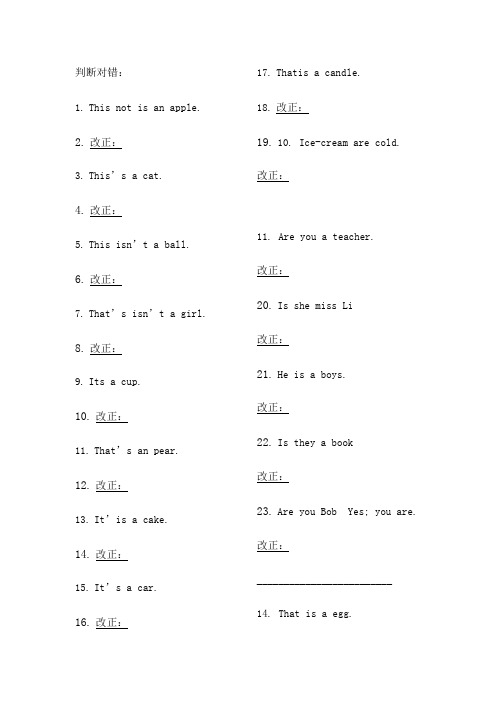
判断对错:1.This not is an apple.2.改正:3.This’s a cat.4.改正:5.This isn’t a ball.6.改正:7.That’s isn’t a girl.8.改正:9.Its a cup.10.改正:11.That’s an pear.12.改正:13.It’is a cake.14.改正:15.It’s a car.16.改正:17.Thatis a candle.18.改正:19.10. Ice-cream are cold.改正:11. Are you a teacher.改正:20.Is she miss Li改正:21.He is a boys.改正:22.Is they a book改正:23.Are you Bob Yes; you are. 改正:_________________________14. That is a egg.改正:15. That’s a Bob改正:16. This Betty.改正:17. It’s isn’t a doll. 改正:18. I’s Mingming.改正:19. I am not a girl.改正:20. This isn’t Lingling. 改正:21. You are Bob and Betty. 改正:22. This is Liu Miss.改正:23. This is Mr Li.改正:24. This is mingming. 改正:25. It’s are a egg.改正:26. I’m a chinese.改正:27. I amn’t Bob.改正:28. He is an apple.改正:29. She is a boy.改正:30. This isn’t a desk. 改正:31. That’s you cat.改正:32. Are your sister Ling-ling 改正:33.Is Bob five Yes; he’s.改正:变复数句:1.I’m a pupil.2.You are not a teacher.3.He’s a teacher.4.It’s a chick.5.She is a girl.6.This is a candle.7.That’s a house.8.It is not a picture.9.She isn’t a worker.10.That isn’t a flag.变单数句:1.We are pupils.2.You are teachers.3.They are clocks.4.They are boys.5.They are girls.6.Those are not jars.7.These are pigs.8.We are workers.9.Those are cakes.10.These are hands.1. I’m a pupil. 否定句2. You are not a teacher. 肯定句3. He’s a teacher. 否定句4. It’s a chick. 否定句5. She is a girl. 否定句6. This is a candle. 否定句7. That’s a house. 否定句8. It is not a picture. 肯定句9. She isn’t a worker. 肯定句10. That isn’t a flag. 肯定句11.We are pupils. 否定句12.Are you teachers 否定句13.Are they clocks 否定句14.Are they boys 肯定句15.Is she a teacher 否定句16.Is it a car 否定句17.Is that an apple 肯定句18.We are workers.19.Are those cakes 肯定句20.Are these hands 否定句21.Is it an apple 否定句22.Is it an apple 肯定句连词成句:1. egg; this; not; is; an;--------------------------------------------------------------2. you; Betty; are; Bob; and;--------------------------------------------------------------3. I; not; am; girl; a;--------------------------------------------------------------4. she; Miss; is;Li;--------------------------------------------------------------5. candle; that; not; is; a;--------------------------------------------------------------6. are; a; and; we; boys; girls;--------------------------------------------------------------7.is; a; gun; it;--------------------------------------------------------------8.this; not; is; a; glove;--------------------------------------------------------------9.are; a; and; ball; a; desk; they;--------------------------------------------------------------10.am; a; I; girl;--------------------------------------------------------------填is;am;are1.Ice-cream _______ cold.2.They _______ not teachers.3.We _______ pupils.4.I_______ a boy.5.You _______ a girl.6.This _______ a book.7.Those _______ not jackets.8.She _______ Miss Li.9.He_______ not a teacher.10.They_______ are pupils.11.They _______ are dogs.12.I _______ a girl.13.You _______ Bob and Betty.14.These _______ flags.15.Those _______ pictures.16.That_______ not a candle.17.I _______ Betty.18.He _______ my teacher.19.She _______ our teacher.20.They _______ cakes.21._______ I right22._______ he a teacher23._______ our pupils Chinese24.He with his friends _______ pupil.25.He and she _______ pupils.26.My teachers _______ good.27.Our teachers _______ good.28.His milk _______ cold.29._______ your mother 3030._______ I wrong31.Her mother and father _______ Chinese.32._______ your Mum a teacher33.Bob and David’s father _______ Mr. Wang.34.Those men _______ my workers.35.Who_______ Englishmen36.Who _______ English37.Who _______ I38.These men _______ Chinese.39.What_______ you doing变一般疑问句; 肯定/否定回答..1.This is my hen.2.——————————3.——————————4.——————————5.You are Bob and David.6.——————————7.——————————8.——————————9.He’s David.10.——————————11.——————————12.——————————13.She’s Ling-ling.14.——————————15.——————————16.——————————17.They are teachers.18.——————————19.——————————20.——————————21.22.Bob’s fine.23.——————————24.——————————25.——————————26.7. This boy is five.——————————————————————————————8. Ling-ling’s Chinese.——————————————————————————————9. Bob and David are pupils.——————————————————————————————10. There is a bird in the tree.——————————————————————————————对划线部分提问:1.This is my bag.2.That’s an egg.3.It’s our car.4.They are fish.5.His name’s Bob.6.Our names are Bob and Betty.7.Its name’s Wangwang.8.We’re Bob and Betty.9.This is Bob.10. That is David.1.That’s Betty.2.His name’s David.3.This is Betty’s kite.4.Bob’s and David’s_________tomato are nice.5.What’s that6. It’s a potato. 复数句7.What’re they8. They’re glass.单数句9.They’re not elephants. 单数句10.They’re not my elephants. 单数句11.Bob and David’s _________father is Mr. Wang.12.They are not Bob’s elephants. 单数句1.That girl is Betty.2.Her name’s Betty.3.These women are Chinese. 单数句4.Is this a man 复数句5.She’s my aunt.6.He is my uncle.7.We are Englishmen.8.They are English.9.Bob’s _______friend are David and Betty.10.We are English.1.I am Bob.2.These girls are pupils.3.Their names are Bob and David.4.She’s ________________Bob 和 Lucy 的 mother.5.Bob’s and Lucy’s___________teacher are Mr. Wang and Miss Li.6.He’s a postman.复数句7.These men are workers. 单数句8.These men are my workers. 单数句9.Ming-ming is Chinese.10.Ming-ming and Ling-ling are Chinese.11.Bob and Betty are pupils.1.We have books.2.red; that; flag; is 连词成句3.red; those; flags; are 连词成句4.It’s an egg.5.Is this an orange car 复数句6.Are they red flags 单数句7.Our teacher_______ have/has got a car.8._______ have/has her friends got a kite9.We have got two books.10.It has got a long nose.11.They have got a pig.12.They have got a pig.1.I’ve got a ball. 否定2.I’ve got a ball.3.They have got books. 一般疑问句4.We have flowers.5.Their names are Bob and David.6.They’re Bob and David.7.They are Bob and David.8.That boy is ten.9.These girls are English.10.Our teacher __________have/has got a bag.11.__________Has/Have her mother and father got a car1.This TV’s big. 同义句2.Ming-ming has a bag.3.Ming-ming’s got a bag.4.These’re long pencils. 同义句5.They have three dogs.6.They’ve got three dogs.7.This is _____a/an red apple; and that’s_____a/an orange box.8.Her friend ________有 a big ball.9.Bob’s mother and father ________有 a car.1.He’s eating an apple.2.He’s eating an apple.3.He is eating an apple.4.Look; two boys ______________swim.5.Listen; a baby ______________cry.6.Bob: How do you do7. Betty: ___________________8.Nice to meet you; Bob.9. _______________________; Betty.10.She has got a car.11.We have got two books.12.I am dancing. 一般疑问句用所给词的正确形式填空:1.Look; two boys ___________sit on the chairs.2.Listen; a baby ___________cry.e on; the bus___________ come.4.Where are the children They _________play football.5.My brother’s reading.6.My brother is reading.7.They are sleeping.8.Is he running 否定句9.Is your father drawing 否定回答10.They’re ___________lie in the sun.11.He’s eating an apple.12.He’s eating an apple.13.They like swimming.1.My mum’s cooking.2.Are Bob and Betty dancing 否定回答3.Our teacher’s fine.4.How _______ be your friend5.What’s he doing He’s running. 复数句6.Are these women dancing 否定句7.It has got a long nose.8.Where ______ be his brothers They ________________stand.9.We are playing football.10.They have got an apple.1.Sit down; please. 否定句2.Don’t close the window. 肯定句3.Please come here. 否定句4.Let’s ________ swim.5.Let her ________ not dance.6.My sister’s reading in the room.7.We have got a car. 否定句8.___________ not late一. 填“是”am; is; are1. Our teacher Miss Li.2. Who I3. his books here4. You Bob.二.填a或an1. old man2. orange bike3. red apple4. new car三. 改错1. That’s you cat .2. Are your sister Ling-ling3. This’s a pear .4. Is Bob five Yes ; he’s .四. 选词填空 I . we .you .he .she .it . they1. Is this a pen Yes ; is .2. Are those glasses No ; aren’t .3. Is your mother a teacher Yes; is .4. Who are am Bob.5. Are you and David ten No; aren’t .6. Is her father Mr. Wang Yes; is.五. 句型转换1. It’s a ball .对划线部分提问2. Her name’s Fang-fang .同上3. This girl’s Fang-fang . 同上4. They have got two dogs .否定句5 . My brother’s two .一般疑问句6. What’s that It’s an egg .复数句7. Are these fish 否定回答8. Are they pens Yes; they are .单数句9. It hasn’t got a kite .肯定句现在进行时测试卷一.用所给词的正确形式填空1 Look; these boys ______run.2 Come on The bus _____come.3 Listen; who _______sing4 Is your friend _____sit No; she _____swim.5 Oh; my birds are ______die6 I _______not writenow .二.句型转换1 This girl is washing .对划线部分提问2 Our teacher’s eating a pear .对划线部分提问3 Are those girls dancing 否定句4 Is Jimmy laughing 否定回答5 My friends are playing .一般疑问句6 Is that pig sleeping 肯定回答7 we not reading ; we are do homework .改错祈使句测试卷一.变否定祈使句:1. Please sit down .2. Do it like this .3. Fang-fang ; come in .4. Go out .二.变肯定祈使句:1. Don’t read the book .2. Let them not dance .3. Don’t let Betty sing .4. Don’t be quick .三. 用所给词的正确形式填空:1. David;_______not late for school.2. _______ quiet ; please .3.________not laugh at me .4. ________is a good boy .四.对划线部分提问:1. My car’s blue .2. My car’s blue .3. Our names are Jingjing and Jimmy .4. Those’re Tom’s fish.5. The girl’s Jane.。
小学英语语法专项练习题含答案 (1)

小学生语法专项练习题名词练习一。
写出下列单数名词的复数形式1。
orange_______________2。
box__________3。
woman____________4.tomato________5。
bus_______ 6。
boy________ 7.baby _______8.watch_______ 9。
photo________10.class_______ 11。
foot________12。
house________13。
pen_______14。
car________ 15。
horse________ 16.radio_______ 17.dish________18。
child________答案:1 oranges 2。
Boxes 3. women 4。
tomatoes 5。
buses 6. boys 7babies8.watches 9. Photos 10 classes 11. feet 12 houses 13 pens 14 cars 15 horses16. radios 17 dishes 18 children二.将下列单词的复数形式改成单数形式1.doctors_________2.cities_______3。
pianos__________4。
ears________ 5。
churches_______6.leaves_________7。
teeth________ 8.zoos____9。
brushes ________ 10.knives__________11.men _________12.pears _________ 答案1。
doctor 2 city 3 piano 4。
ear 5。
church 6。
leaf 7 tooth 8zoo 9brush 10 knife11。
man 12 pear三.请从括号里选出正确的答案1. Please give me__(two /two cups of )coffee。
小学英语语法专项练习题含答案
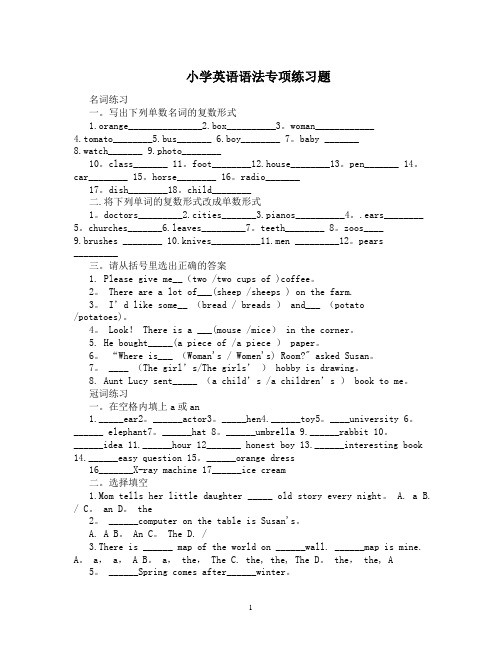
小学英语语法专项练习题名词练习一。
写出下列单数名词的复数形式1.orange_______________2.box__________3。
woman____________4.tomato________5.bus_______6.boy________ 7。
baby _______8.watch_______ 9.photo________10。
class_______ 11。
foot________12.house________13。
pen_______ 14。
car________ 15。
horse________ 16。
radio_______17。
dish________18。
child________二.将下列单词的复数形式改成单数形式1。
doctors_________2.cities_______3.pianos__________4。
.ears________ 5。
churches_______6.leaves_________7。
teeth________ 8。
zoos____9.brushes ________ 10.knives__________11.men _________12。
pears_________三。
请从括号里选出正确的答案1. Please give me__(two /two cups of )coffee。
2。
There are a lot of___(sheep /sheeps ) on the farm.3。
I’d like some__ (bread / breads ) and___ (potato/potatoes)。
4。
Look! There is a ___(mouse /mice) in the corner。
5. He bought_____(a piece of /a piece ) paper。
6。
“Where is___ (Woman's / Women's) Room?" asked Susan。
小学英语语法专项练习题含答案

小学英语语法专项练习题名词练习一.写出下列单数名词的复数形式1.orange_______________2.box__________3.woman____________ 4。
tomato________5。
bus_______ 6。
boy________ 7。
baby _______ 8。
watch_______ 9.photo________10.class_______ 11。
foot________12.house________13。
pen_______ 14。
car________ 15.horse________ 16。
radio_______17.dish________18。
child________二。
将下列单词的复数形式改成单数形式1.doctors_________2.cities_______3。
pianos__________4。
ears________ 5。
churches_______6。
leaves_________7。
teeth________ 8。
zoos____ 9.brushes ________ 10.knives__________11。
men _________12。
pears _________三.请从括号里选出正确的答案1。
Please give me__(two /two cups of )coffee.2. There are a lot of___(sheep /sheeps ) on the farm.3。
I’d like some__ (bread / breads ) and___ (potato/potatoes)。
4。
Look! There is a ___(mouse /mice) in the corner。
5。
He bought_____(a piece of /a piece ) paper。
6。
“Where is___ (Woman’s / Women’s)Room?” asked Susan.7. ____ (The girl’s/The girls' ) hobby is drawing。
- 1、下载文档前请自行甄别文档内容的完整性,平台不提供额外的编辑、内容补充、找答案等附加服务。
- 2、"仅部分预览"的文档,不可在线预览部分如存在完整性等问题,可反馈申请退款(可完整预览的文档不适用该条件!)。
- 3、如文档侵犯您的权益,请联系客服反馈,我们会尽快为您处理(人工客服工作时间:9:00-18:30)。
语法专项练习---------现在完成时41. 现在完成时通常可与表示过去不确定时间的时间状语连用,如already, yet, just, before等副词时间状语。
例子见上述“主要用法”中。
例如:1)I have already returned the pen to him.2)Have you washed my clothes yet? ----Yes, I have just washed them.3)I have seen the man before.说明:before有时也可用于一般过去时(这与用现在完成时意思差不多),如I told you before.我早就告诉过你。
2. 现在完成时通常可以与包括“现在”在内的表示一段时间的时间状语连用,如since..., for...;ever, never,recently(最近),today, this week (year), these days (weeks, years), in/during the last/past two years, so far等。
例如:1)We have known each other since we came to the school.2)I have collected ten stamps this week[these weeks].3)Have you seen him these days?说明:ever, never有时也可用于一般过去时(这与用现在完成时意思差不多),如I never saw the man.※区别用法1. already与yet一般情况下,already表示“已经”,主要用于肯定陈述句,一般在句中;yet表示“已经”或“仍然,还”是用于疑问句或否定句,一般在句末。
比较:1)He has already come.2)Has he come yet?3)He hasn’t come yet.2. ever与yetever与yet均可用于疑问句、否定句,但yet表示“已经”或“仍然,还”,一般“时间上距离现在不是很远”;ever表示“曾经,以往任何时候”,“时间上距离现在可近可远”,反义词never。
体会:1)Have you ever milked a cow? 你曾经挤过牛奶吗?----No, I never have.或No, never. 没有,从来没有过。
(问可以是有生以来的经历)2)Have you milked the cow yet? 你已经给那头牛挤过奶了吗?----No, I haven’t yet.或No, not yet.(问现在说话说时的情况)3. for与sincefor和since均可引导一个时间状语,与现在完成时连用,区别如下:“for + 一段时间”,意思为“共计……(时间)”;for是prep.,后面只能跟一个短语,即只能引导一个时间短语。
“since + 某一时间”,意思为“自从……(以来)”;since是prep.&conj.,后面可以跟一个短语,也可以跟一个句子,即既可以引导一个时间短语,也可以引导一个时间从句。
例如:1)He has sat here since two o’clock.He has sat here since he came here.2)He has sat here for two hours.4. two years ago与for two years, since two years ago 三者的意思和连用的时态不一样:例如:1)He lived here two years ago. 他两年前住在这儿。
(已有两年不住在这儿了)2)He has lived here for two years. 他在这儿住两年了。
(两年前开始住的,一直住到现在,还可能继续住下去)比较:He lived here for two years. 他过去(曾经)在这儿住两年了。
(是哪两年不清楚)He has lived here since two years ago. 两年来,他一直住在这儿。
练习用since和for填空______two years ____two years ago ___last month ______ 1999 _______yesterday _______ 4 o’clock _______ 4 hours _____an hour ago___we were children _____ lunch time ____ she left here1. He has lived in Nanjing _______ the year before last.2. I’ve known him ______ we were children.3. Our teacher has studied Japanese ______ three years.4. She has been away from the city ______ about ten years.5. It’s about ten years __________ she left the city.6. Jim has been in Ireland ______ Monday.7. Jill has been in Ireland ______ three days.8. His aunt has lived in Australia ______15 days.9. Mary is in her office. She has been there ______ 7 o'clock.10. India has been an independent country ______1974.11. The bus is late. They've been waiting ______ 20 minutes.12. Nobody lives in those houses. They have been empty ______ many years.13. Mike has been ill ______a long time. He has been in hospital ______ October.用never, ever, already, just, yet, for, since 填空.1. I have ___________ seen him before, so I have no idea about him.2. Jack has _____________ finished his homework.3. Mr. Wang has taught in this school ____________ ten years.4. “Have you ____________ seen the film?” “No, I have ____________ seen it.”5. “Has the bus left ___________?” “Yes, it has _____________ left.”用动词的适当形式填空1.She‟s _____________ (live) here ever since she was ten.2.Both of them ________________ (be) in Hong Kong for ten days.3.Both of them ____________ (come) to Hong Kong ten days ago.4. Half an hour __________ (pass) since the train __________ (leave).5. Mary________(lose) her pen. ________ you _______(see) it here and there?6. _________ you _____ (find) your watch yet?7. ---Are you thirsty? ---No, I _________just _________ (have) some orange.8. We _________ already _________ (return) the book.9. ________ they _______ (build) a new school in the village?10. I _____________ (not finish) my homework. Can you help me?11. My father _____ (read) the novel twice.12. I _________ (buy) a book just now.13.-Mum,may I go out and play basketball?-______you______(finish)your homework yet?14. My father ___________ (read) this book since yesterday.15. I____ already ____ (see) the film. I ________ (see) it last week.16. My mother __________ (come) to see me next Sunday.17. My father ____ just ____ (come) back from work. He is tired now.18. Where’s Li Ming? He __________ (go) to the teacher’s office.19. I __________ (work) here since I ______ (move) here in 1999.20. So far, I _______________(make) quite a few friends here.21. How long ________ the Wangs ______________(stay) here? For two weeks.22. I ________ just ___________ (finish) my homework.23. He ________ (go) to school on foot every day.24.____ you ______ (find) your science book yet?25. Look! The monkey __________ (climb) the tree.。
